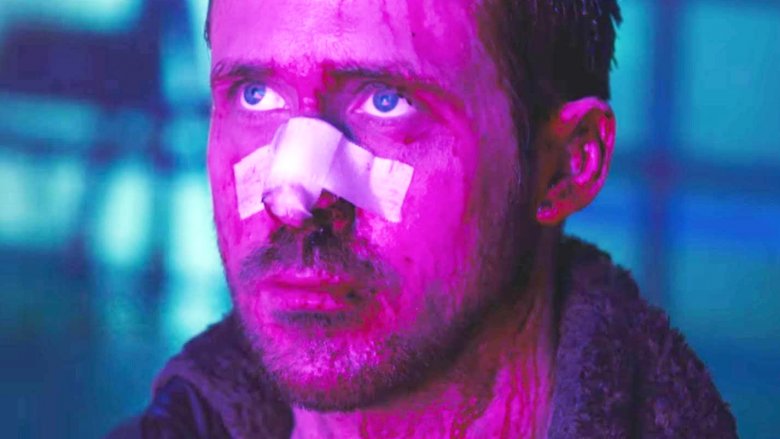Blade Runner 2049's Alternate Ending Revealed
Warning: This post contains significant spoilers for Blade Runner 2049.
In director Denis Villeneuve's Blade Runner 2049, the follow-up flick to Ridley Scott's 1982 sci-fi classic, Ryan Gosling's Officer K uncovers a massive secret that threatens to destroy what little is left of society. On his mission to find the truth, he also endeavors to find the missing former blade runner Rick Deckard, played by Harrison Ford. What unfolds is a slow-burning tale that ends with K leading Deckard to reunite with the daughter he had with the replicant Rachael 30 years ago—and whom he purposefully abandoned to keep her protected from danger. But when Deckard enters the building, K falls to the steps, bleeding out from his wounds, and slowly drifts away as snow falls around him.
Much like Scott's first film, Blade Runner 2049 has a conclusion that's pretty open-ended and leaves room for another sequel. But it wasn't originally written that way.
In an interview with The Los Angeles Times, Blade Runner 2049 co-writer Hampton Fancher revealed that his idea for the movie ended quite differently. The alternate conclusion left no place for another movie, because Fancher wrote that Deckard was the one who died at the end.
As Fancher explained, "In my script, Deckard died at the end, but you have him live. The first time Ridley [Scott] and I ever considered doing a second Blade Runner, in 1986 or whatever it was, I came up with an idea about Deckard and his next job—and it's kind of horrifying what happens in my little fantasy. Now that Deckard lives, that idea is back in my head. But I'm not going to tell you what it is."
But as things behind the scenes changed, Fancher ended up giving into fellow screenwriter Michael Green's ending, which ended up the one seen on screen. Green spoke about his version with Entertainment Weekly, explaining that the ending isn't meant to be ambiguous in any sense.
"I was surprised to find out that anyone thought [K] didn't die. And I can say this: the non-casual fan might recognize the music cue that plays in that moment," Green said, referring to the moment in the sequel that calls back to the "Time to Die" scene from the original.
While it remains unclear whether Fancher will ever get to dive into his tucked-away idea in a future Blade Runner sequel, Green stated that he has "certainly fantasized" about making more Blade Runner movies, but building a full-on franchise was never his or Fancher's intention in developing Blade Runner 2049.
But on the opposition, there is still plenty of space for exploration into Deckard's status as a human or a replicant. Some believe that Blade Runner 2049 suggests he isn't a replicant, but some see it differently. Green and Fancher offered up their own thoughts on the theories.
"One of my favorite outcomes from the film from early reactions I'm seeing is that people are coming out of it even more sure of the opinion that they've held—and still not agreeing. That gives me tremendous joy... the debate seems to continue, and people seem to think that those who think the opposite of them are nuts," said Green.
Fancher agreed, stating that when the replication process is successful, "you don't know that you're a replicant," so Deckard wouldn't know either. However, he mentioned that "deeming Deckard a replicant closes the door on the party," and that "it's got to be up in the air or there's no dog fight."
Green then said he doesn't think the movie "answers definitively one way or the other," but he's pleased that people are still talking about Deckard's identity. "That's what we set out to do. We wanted to make sure that the ambiguity is built into the story," Green said.
With K now gone, only time will tell where Rick Deckard will go next, and who he really is.
